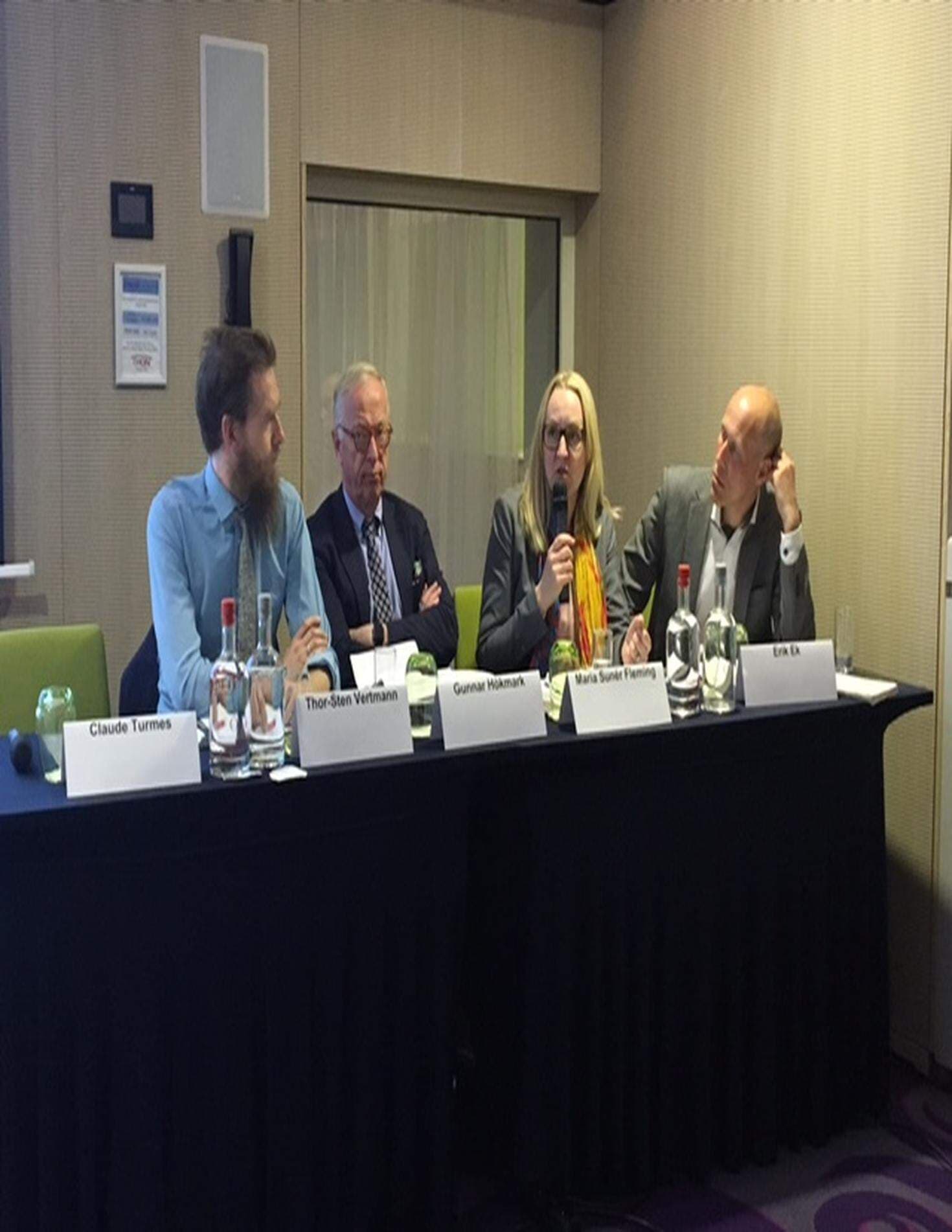How the Nordics achieved an integrated electricity market – Lessons for Europe?
Last November, the European Commission presented its package "Clean Energy for All in Europe". Among the proposals currently being discussed in the Council of Ministers and in the European Parliament are the draft legislation on the electricity market design, security of supply and governance of the energy union.

The Society of Politics and Business, SPN, had therefore invited to a seminar in Brussels in order to discuss the proposals and sharing experiences from the Nordic electricity market, where the combination of deregulation and full integration of the electricity system has brought about a well-functioning energy-only market, with significant transmission capacity to neighbouring countries. In addition, the Swedish electricity market is almost completely free from CO2 emissions.
Among the speakers were the Members of the European Parliament Claude Turmes and Gunnar Hökmark, Thor-Sten Vertman from the Permanent Representation of Estonia, Maria Sunér Fleming from Swedish Enterprise and Erik Ek from Svenska Kraftnät.
Maria Sunér Fleming, responsible for energy, climate and infrastructure policies at the Confederation of Swedish Enterprise, thought the Commission proposal on electricity market design included some positive features, such as clearly stating that the "energy-only-market" should be the foundation for the EU electricity market and that regulated prices should be phased out, as well as clearly taking a consumer perspective.
However, it is important to respect national competencies regarding the energy mix and security of supply. Detailed regulation and policy overlaps must be avoided. We are very sceptical of the proposal for mandatory regional operational centres, ROCs. Instead, cooperation should be developed by member states and relevant TSOs. The Swedish and Nordic electricity markets are good examples. Here, progress has been made gradually and is led by new technologies and knowledge. Political intervention has been limited. This has led to competitive electricity prices, security of supply and a positive environmental impact, something that the EU should now take into account, she said.
Erik Ek, Senior Vice President at Svenska Kraftnät, agreed.
The very close cooperation we have in the Nordic countries has developed step by step. It is based on an early cooperation between Sweden and Norway, and has led, among other, to Europe's leading power market Nord Pool. We are now worried about some of the proposals, not least the ROC:s and the authority given to them. In this context, it should be underlined that Nord Pool is no way a ROC. On the other side though, there is a strong support for pricing and market mechanisms in the proposal, which is good, "Ek said.
Estonia, who takes over the EU presidency this autumn, has made the electricity market's design one of its priorities. Thor-Sten Vertmann, responsible for energy policy at the Permanent Representation of Estonia, said that all forms of state involvement in the electricity market must be discontinued.
We favour market liberalisation and consumer empowerment. Subsidies and regulated prices need to go out. In the end, consumers should influence their electricity consumption and electricity bills. As far as the negotiations in the council are concerned, we will assign most resources to the proposal on electricity market design. We believe that elements of this proposal will be disruptive for the Nordic markets. We are not expecting any tangible results during the Estonian presidency, said Vertmann.
MEP Gunnar Hökmark (m), shadow rapporteur for the governance of the energy union:
Today we have a stable and well-functioning electricity market in Sweden. In addition CO2 emissions have decreased and energy efficiency and use of biofuels have increased. This positive situation is not due to political decisions or political long-term plans, but rather because reality always changed the plan. Deregulation of the electricity market, which began in the 80's, is also an important reason. The Nordic electricity markets today are fully integrated. The conclusion is that the markets are much better at adapting to new conditions than political and bureaucratic plans and guidelines, said Hökmark.
MEP Claude Turmes, from the Green Group and rapporteur on the proposal for electricity market design, agreed that market solutions has proved to be by far the best solution.
With several thousand different power sources, the market is the only solution for coordination, but it should not be ignored that political decisions and objectives are important in order to create the desirable economic incentives. For example, the CO2 tax in Sweden has led to investments in biofuels and renewables. I also think that the proposal as regards the ROC:s probably is not a big game changer for the Scandinavian markets. For the rest of Europe, it can, on the other hand, be very disruptive. However, better coordination is necessary and the ROC:s will be of strategic importance, said Turmes.
The seminar was chaired by Gunnar Hökmark (m), chairman of SPN, and gathered about 50 participants from EU institutions, companies, business organisations and NGO:s.